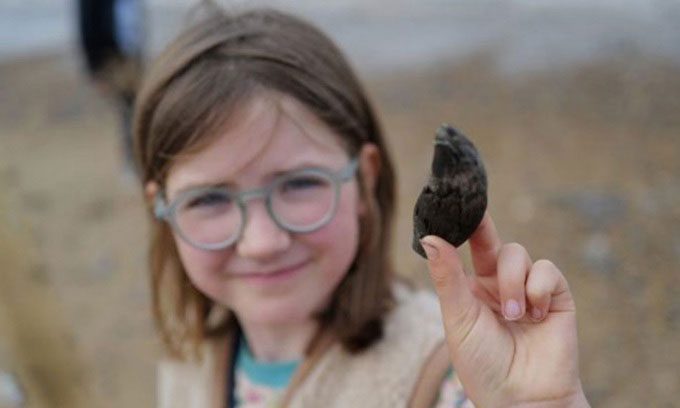The 9 cm long canine tooth belongs to the ancestors of brown bears, discovered by a 9-year-old girl on the beach, who initially mistook it for fossilized wood.
A 9-year-old girl named Etta found a 700,000-year-old bear tooth on the beach at West Runton, Norfolk, England, while vacationing with her family this summer, BBC reported on December 26. Initially, Etta thought it was a piece of fossilized wood and took it home in her bag. However, a paleontology expert later confirmed that this specimen, measuring approximately 9 cm, was an ancient bear tooth.

Etta discovered a 700,000-year-old bear tooth on the beach in Norfolk. (Photo: BBC)
Etta “loaned” the tooth to geologist David Waterhouse at the Norfolk Museums Service after meeting him at a fossil identification event at the Cromer Museum.
“This is the first time I’ve seen such a large and perfect bear canine in my 16 years of working here. We find many deer fossils, but as we move up the food chain, you see fewer and fewer predators, like bears,” Waterhouse stated. He also confirmed that the tooth belonged to the ancestor of the common brown bear.
The Deep History Coast of Norfolk is a 35 km stretch of coastline between Weybourne and Cart Gap. An impressive discovery here is the oldest archaeological site in Northern Europe, where scientists found human footprints dating back 800,000 years in 2013. West Runton is also home to the largest and oldest mammoth fossil ever recorded in England. Waterhouse noted that discoveries here contribute to a rich picture of the development of flora and fauna 700,000 years ago.
The earliest group of humans, Homo antecessor, migrated across Doggerland, the land bridge connecting present-day England, Germany, and the Netherlands. Waterhouse explained that humans were still rare at the time, but everything in Norfolk was very suitable for them, from birds and wildlife to shellfish and flint, ideal for crafting sharp tools. “Humans had to avoid hyenas, lions, and bears while living alongside deer, wild boar, beavers, and mammoths,” he said.
Etta and her two sisters developed a passion for fossils after participating in a fossil hunting course organized by the Norfolk Wildlife Trust earlier this year, according to Etta’s mother, Thea Ferner. Waterhouse also praised “responsible” fossil hunters like Etta, who do not dig too deeply into cliffs, report their findings, and note the time and location of their discoveries.


















































